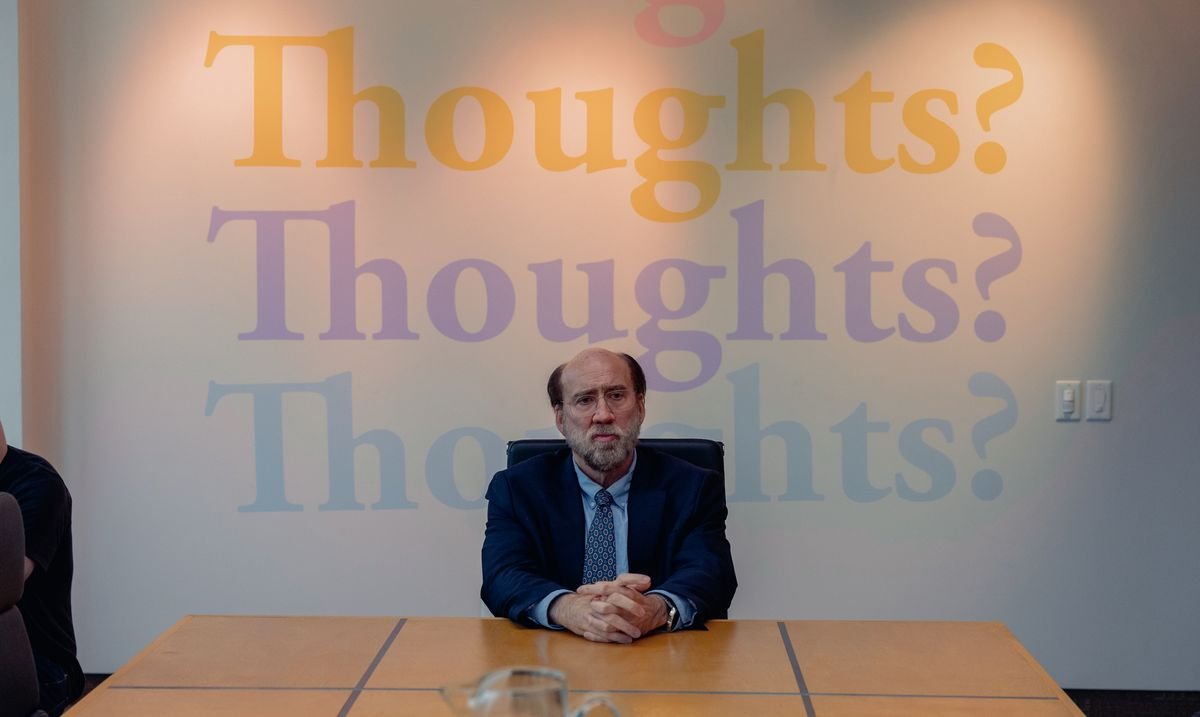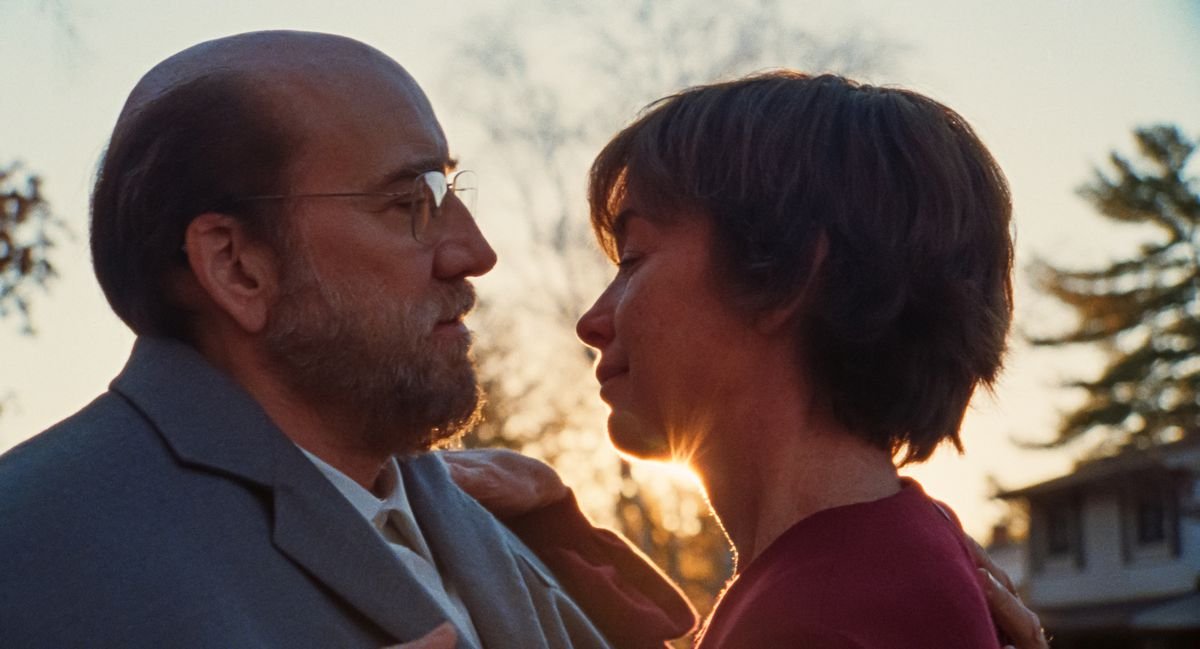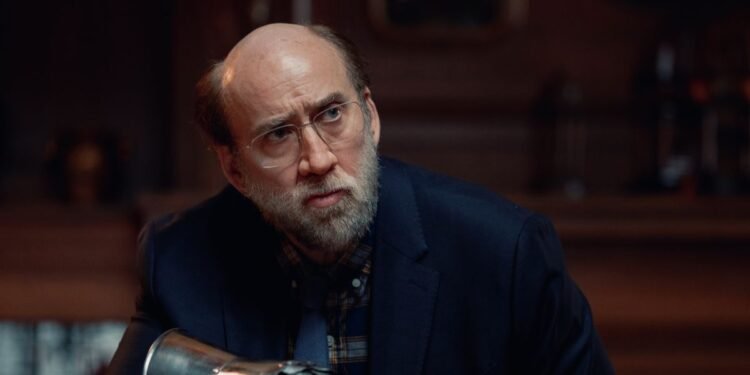This review of Dream Scenario was originally posted in conjunction with the film’s premiere at the 2023 Toronto International Film Festival. It has been updated for the movie’s theatrical release.
From the moment The Unbearable Weight of Massive Talent was announced, it drew a lot of excitement by promising a meta movie that fully embraced Nicolas Cage’s meme status and over-the-top roles by letting him play himself. Cage isn’t repeating the exact same trick with Dream Scenario, the new movie by Sick of Myself filmmaker Kristoffer Borgli, produced by Hereditary and Midsommar director Ari Aster and released by A24. His character in Dream Scenario isn’t named “Nicolas Cage.” But the movie feels like an even more meta and poignant exploration of his status as an online meme.
Best described as the funny prequel to Nightmare on Elm Street we didn’t know we needed, Dream Scenario has Cage’s character, Paul Matthews, becoming famous for reasons completely out of his control: He begins appearing in the dreams of people around the world. Suddenly, he’s famous, but that fame comes with unparalleled judgment.
Borgli’s script feels tailor-made for Cage, who told audiences after the film’s world premiere at the Toronto International Film Festival that he immediately connected with the story of viral fame. Ten years ago, a YouTube montage of Nicolas Cage characters having meltdowns, titled “Nicolas Cage Losing His Shit,” blew up online, with no context provided for any of the performances. Cage felt he had no control over their reception. For young audiences in particular, Cage’s acclaimed performances and Best Actor Academy Award are less important than his meme status, and the parade of smaller, stranger movies where he plays volatile weirdos and over-the-top characters to the point of self-parody.

Photo: A24
This is why his role in Dream Scenario is both surprising and a fantastic avenue for Cage to deliver outstanding character work. Paul Matthews is possibly the most boring man in the world: a schlubby, balding, bearded, unpublished evolutionary biology professor who can’t hold the attention of his students, his daughters, or his wife. While hints of Cage’s more outsized, exaggerated performance skills surface in Paul, used for exquisite comedic purposes, he’s mostly just a bland, silent guy who would pass in any situation without being noticed.
This makes it very strange that so many people who don’t know him start dreaming about him at the same time. And he doesn’t even do anything in these dreams. He just stands in the background or walks through the action with a blank expression. This is true even if the dreamer is having a nightmare about being disemboweled by a demon. Paul just stands apathetically on the sidelines — a hilarious sight that heavily recalls the way Ari Aster contrasts extremity and mundanity, particularly in his 2023 oddity Beau Is Afraid.
Paul’s presence in other people’s dreams turns him into an overnight celebrity, even though he’s literally done nothing to earn that fame. (Seemingly a comment on so many other cases of viral fame.) Paul is mildly intrigued by his new notoriety, but all he really cares about is using the new doors opening to him to fulfill his dream of getting published. And even that goal is mostly a spiteful attempt at revenge on a former colleague who published some ideas Paul mentioned in passing, but never acted on, years ago. Cage is fantastic at playing Paul’s pathetic attempts at acting the part of a worldwide idol, the small delights he takes in becoming what he thinks people see him as. He’s a sympathetic character, but not one audiences are intended to actually support.

Photo: A24
Dream Scenario’s vague, nebulous type of fame gives Borgli an avenue to comment on celebrity and its price without taking a specific stand. He’s just exploring the cost of being highly visible, being up for endless interpretation by total strangers, and being disconnected in the public eye from any actual real-world intentions or actions. Once Paul starts deliberately taking a more active role in people’s dreams, the script takes a Charlie Kaufman-esque approach, playing with the ideas around so-called cancel culture as part of the world of instant fame. He also keeps the visuals refreshing and interesting, fully veering into dream-sequence horror, with enjoyably weird results.
Dream Scenario film loses some of its steam in its third act. Borgli’s script tries to remain separated from our reality, trying not to draw direct parallels between Paul’s experiences and real celebrity scandals. (Thousands of people dreaming about you murdering them isn’t exactly the same as posting an offensive tweet.) But the references to buzzy terms like “cancel culture,” the mentions of Joe Rogan and Tucker Carlson, and the cavalcade of unexpected yet impeccably used cameos make it hard to separate the film’s absurdist world from our own, even amid a third-act bit that feels straight out of South Park.
With Dream Scenario, Borgli wants to touch on hot-button issues, then toss them aside before they become too complicated or real. But the film’s saving grace is the way it keeps its messages about fame grounded in the experiences of an ultimately unremarkable, notably dumb protagonist. The ending doesn’t land, but there’s no denying the hilarious, poignant two-thirds that precede it.
Dream Scenario is in theaters now.
















































